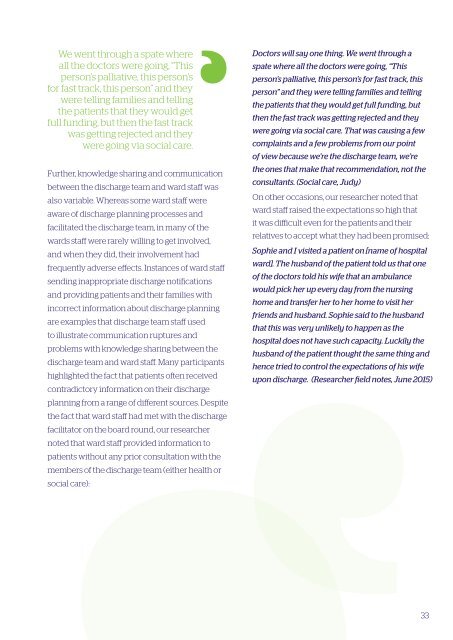Hospital Discharge
3Jzx309Yruj
3Jzx309Yruj
You also want an ePaper? Increase the reach of your titles
YUMPU automatically turns print PDFs into web optimized ePapers that Google loves.
We went through a spate where<br />
all the doctors were going, “This<br />
person’s palliative, this person’s<br />
for fast track, this person” and they<br />
were telling families and telling<br />
the patients that they would get<br />
full funding, but then the fast track<br />
was getting rejected and they<br />
were going via social care.<br />
Further, knowledge sharing and communication<br />
between the discharge team and ward staff was<br />
also variable. Whereas some ward staff were<br />
aware of discharge planning processes and<br />
facilitated the discharge team, in many of the<br />
wards staff were rarely willing to get involved,<br />
and when they did, their involvement had<br />
frequently adverse effects. Instances of ward staff<br />
sending inappropriate discharge notifications<br />
and providing patients and their families with<br />
incorrect information about discharge planning<br />
are examples that discharge team staff used<br />
to illustrate communication ruptures and<br />
problems with knowledge sharing between the<br />
discharge team and ward staff. Many participants<br />
highlighted the fact that patients often received<br />
contradictory information on their discharge<br />
planning from a range of different sources. Despite<br />
the fact that ward staff had met with the discharge<br />
facilitator on the board round, our researcher<br />
noted that ward staff provided information to<br />
patients without any prior consultation with the<br />
members of the discharge team (either health or<br />
social care):<br />
Doctors will say one thing. We went through a<br />
spate where all the doctors were going, “This<br />
person’s palliative, this person’s for fast track, this<br />
person” and they were telling families and telling<br />
the patients that they would get full funding, but<br />
then the fast track was getting rejected and they<br />
were going via social care. That was causing a few<br />
complaints and a few problems from our point<br />
of view because we’re the discharge team, we’re<br />
the ones that make that recommendation, not the<br />
consultants. (Social care, Judy)<br />
On other occasions, our researcher noted that<br />
ward staff raised the expectations so high that<br />
it was difficult even for the patients and their<br />
relatives to accept what they had been promised:<br />
Sophie and I visited a patient on [name of hospital<br />
ward]. The husband of the patient told us that one<br />
of the doctors told his wife that an ambulance<br />
would pick her up every day from the nursing<br />
home and transfer her to her home to visit her<br />
friends and husband. Sophie said to the husband<br />
that this was very unlikely to happen as the<br />
hospital does not have such capacity. Luckily the<br />
husband of the patient thought the same thing and<br />
hence tried to control the expectations of his wife<br />
upon discharge. (Researcher field notes, June 2015)<br />
33


